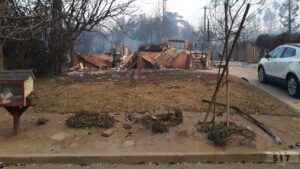Navigating Recovery: Personal Finance Strategies After a Natural Disaster
At Extreme Investor Network, we understand that natural disasters can have devastating effects on individuals and families, especially for older adults. The story of Karen Bagnard, a 79-year-old resident of Altadena, California, who lost her home in the January 2025 Los Angeles-area wildfires, shines a spotlight on the unique challenges faced by seniors during such crises. Karen’s experience highlights the importance of preparedness, financial literacy, and community support in the aftermath of natural disasters.
The Reality of Losing a Home
On January 7, 2025, Karen Bagnard found herself evacuated from her home of over 50 years as the Eaton Fire spread alarmingly close. Despite an initial sense of safety, the dynamic nature of wildfires left her family with no choice but to evacuate. Tragically, her return revealed a landscape reduced to a "smoldering pile of debris," a common sight for many who share similar stories across the country.
For older adults like Karen, losing a home is not just a loss of property—it often encompasses years of memories, stability, and financial security. As Karen considers how to rebuild her life, we see the broader implications of such events, especially as the population of seniors continues to grow.
Understanding Vulnerabilities
Older adults are particularly vulnerable during natural disasters. It is projected that by 2034, there will be more adults over 65 than children under 18 in the United States. Yet, the current disaster planning frameworks often overlook their specific needs. Displacement can lead to significant emotional and physical stress, especially for individuals with chronic health conditions prevalent among seniors—nearly 80% have two or more chronic issues, including respiratory and heart diseases.
In the wake of disasters like the Los Angeles wildfires, assistance may dwindle as the immediate recovery phase shifts into a long-term rebuilding period. It’s this medium-term phase where many seniors often fall through the cracks, highlighting an urgent need for ongoing support.
Financial Considerations for Recovery
Losing a home impacts your financial landscape in several ways. Here are some strategies from Extreme Investor Network that can empower victims of disasters to regain their financial footing:
1. Assess Your Insurance Coverage
- Review your homeowners’ or renters’ insurance. Seniors may have fully paid off their homes and opted for minimal insurance, making them vulnerable in such situations. Understanding your coverage options can help mitigate future risks.
2. Explore Disaster Relief Funds
- Organizations like the Small Business Administration (SBA) provide loans and grants for rebuilding efforts. Additionally, local nonprofits often have emergency funds to assist disaster victims. Karen has already applied for an SBA loan, highlighting a proactive approach to leveraging available resources.
3. Community Support Initiatives
- Connecting with community organizations can provide essential support. For Karen, members from the Pasadena Village community not only extended temporary housing but also provided essential resources to help her navigate her recovery. Building a community safety net is invaluable.
4. Establish a GoFundMe or Fundraising Effort
- Crowdfunding platforms can be an effective way to raise necessary funds post-incident. Karen’s family took this step to provide financial relief, which can be significant in a recovery journey.
5. Plan for the Long-Term
- Rebuilding after a disaster often requires a long-term plan. This includes budgeting for temporary housing, avoiding high-interest loans, and ensuring sustainable rebuilding practices. Engage a financial advisor to lay out a clear pathway to recovery.
Resilience and Hope Amid Loss
Despite the challenges she faces, Karen Bagnard remains optimistic. Amid the ashes of her home, she finds remnants of hope—surviving artifacts that symbolize her enduring spirit. With help from community members and support organizations, Karen is navigating not just the physical but also the emotional recovery from this tragedy.
Her story illustrates a broader lesson: while the immediate aftermath of natural disasters tends to attract support and attention, it’s the long term where sustained community engagement and comprehensive financial planning become pivotal.
At Extreme Investor Network, we emphasize the power of preparedness, community connection, and financial knowledge. By taking proactive steps today, we can help ensure that when faced with unexpected tragedies, individuals and families are not only prepared but also capable of rising above the challenges to rebuild their lives.
For more insights and resources on personal finance, community resilience, or if you want to share your journey, explore our resources at the Extreme Investor Network. Together, we can strengthen our financial knowledge and community ties to weather any storm.

